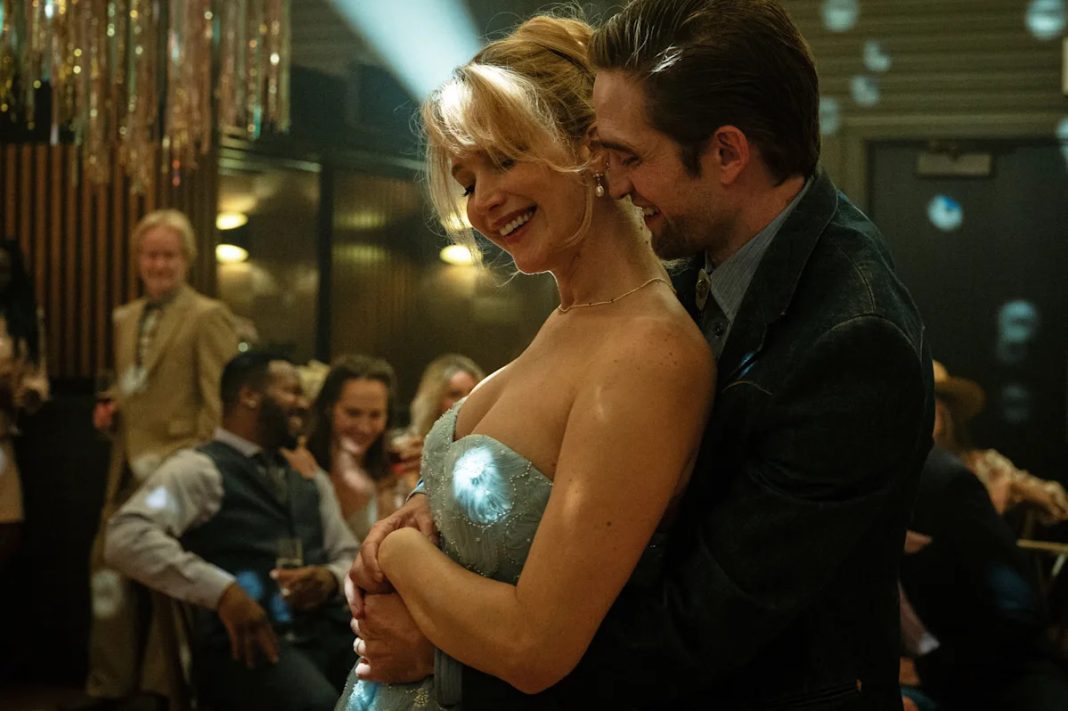A primal punk spirit rages through Lynne Ramsay’s “Die, My Love,” a jagged, go-for-broke psychodrama starring Jennifer Lawrence as an increasingly unhinged new mother and Robert Pattinson as her husband.
In this cauldron of marital nightmare, set in a ramshackle rural Montana home, there are fires, real and imagined, and a variety of wildlife. There’s an incessantly yapping dog, brought home by Jackson (Pattinson) shortly after the couple move in from New York. There’s a horse in the road, inopportunely. And on the shirt on Grace (Lawrence) is a tiger. But, more than these animalistic flourishes, there is Grace, herself. In a moment early in the film, she prowls on all fours through tall grass, with a knife in her hand.
The shorthand description of Ramsay’s film, adapted from a 2012 novel by the Argentine writer Ariana Harwicz, is that it’s about a woman with postpartum depression. But that’s not quite right. It’s more about the power and urges of a woman who, like a beautiful, feral creature, is not taking to domestication.
That’s the appealing through line of “Die, My Love,” though it can be difficult to firmly grasp it in Ramsay’s piercing but tediously overamplified character study. Still, as unkempt and overwrought as “Die, My Love” is, it’s not a movie that’s timidly weighing in on parenting and gender roles. There’s plenty to admire in Ramsay’s uncompromising and delirious portrait of marital hell, particularly in the bracingly raw performance of Lawrence. The abandon with which she throws herself into the role is enough to make you exclaim “Mother!”
Grace and Jackson have moved near his childhood home. Their house belonged to Jackson’s uncle before he killed himself. Jackson’s parents (Nick Nolte, Sissy Spacek) live nearby, and Spacek’s knowing eyes suggest they went through something not so dissimilar long ago, casting Grace’s struggles as part of a long, gothic American history. Soon after moving in, the couple dance ferociously before winding up naked on the floor.
That scene is announcement of the pitch Ramsay, the great Scottish filmmaker of “Ratcatcher” and “We Need to Talk About Kevin,” is working at and of how much her stars are with her on the ride. This is the first movie together for the former teen idols. But I found myself wondering if Lawrence and Pattinson’s evident chemistry works against the film.
Pattinson’s Jackson is some ways a stereotypical dude and foil to Grace. He drinks Budweiser, goes absent with work and can seem more interested in their young son, or the dog, than in Grace. But Pattinson has always exuded a bemused resistance to male tropes that makes him less of an oppositional force to Grace. Pattinson does a lot with concerned looks, as Grace’s behavior grows more extreme. But a more conventional leading man might have been better suited to the role, and clarified their dynamic.
But clarity is also not what Ramsay is after. Working from a script she penned with playwrights Enda Walsh and Alice Birch, Ramsay sticks resolutely to Grace’s disturbed perspective. The sound design, by Tim Burns and Paul Davies, is purposefully chaotic, filled with barking and the children’s music Grace blares as she stomps half naked through the house, ignoring housework and indulging in sexual fantasies. (LaKeith Stanfield has a small, peculiar part.) Grace is also a writer who isn’t writing, so her manic mindset has some echoes with Jack Torrance in “The Shining.”
So, no, this isn’t postpartum, and Grace, herself, makes it clear. Her son is great, she says. “It’s everything else that’s f—ed.” What falls into everything else? It’s mostly the things that are trying to subtly and not so subtly conform Grace to a simple and restrictive mom persona. Heaven help the cheery suburban mothers who try to make small talk with her at a birthday party. Even the classic rock Jackson plays in his truck irks her. “I hate guitars,” she pronounces.
It helps for “Die, My Love” to get out of the house, where the movie is overwhelmingly, even oppressively set. “Die, My Love” might have benefited from more scenes like these that let Lawrence use her comedic talents more. Instead, a live-wire performance gets suffocated, and the conceptual force of the movie ends up feeling more oppressive to Grace than anything else.
“Die, My Love,” a Mubi release, is rated R by the Motion Picture Association for sexual content, graphic nudity, language and some violent content. Running time: 118 minutes. Two and a half stars out of four.

